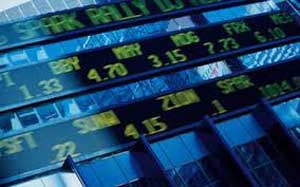Friday Feb 20, 2026
Friday Feb 20, 2026
Thursday, 1 October 2015 00:00 - - {{hitsCtrl.values.hits}}
London (Reuters): Stocks were on track to end their most bruising quarter in four years with gains on Wednesday, led by shares that have been most exposed to global economic slowdown and commodity sector rout that have rattled investors in recent days.
It was a similar pattern in foreign exchange where emerging market currencies, having been crushed to historic lows, rose against the dollar.
In early trade the FTSEuroFirst 300 index of leading European shares was up 1.9% at 1,361 points, with Germany’s DAX and France’s CAC 40 both up 2.3%.
Shares in mining and trading firm Glencore, which plummeted on Monday on the back of sliding commodity prices, rose 6% after it sought to reassure investors over its debt situation. They had risen 17% on Tuesday.
Britain’s FTSE 100 was up 2%, and US stock futures pointed to a rise of around 1% at the open on Wall Street.
Overall, investors will be glad to see the back of the third quarter.
“The market is a bit oversold but there are still worries over the growth outlook and Central Bank policy,” said Antonin Jullier, head of equity trading strategy at Citi in London.
“The kind of volatility we are seeing is not the good kind. Risk appetite is being hurt.”
The FTSEuroFirst is on track to post a 10% loss in the third quarter, the biggest since a 17% decline exactly four years ago in the white heat of the euro zone crisis.
Earlier in Asia, MSCI’s broadest index of Asia-Pacific shares outside Japan rose 1.8% after plumbing its lowest since June 2012 on Tuesday on fears that China’s economic slowdown would curb that country’s huge appetite for commodities and resources.
The index was on track for a 17.5% loss in the quarter, also its worst performance in four years.
Japan’s Nikkei brushed aside an unexpected drop in the country’s industrial output to close up 2.7%, paring losses for the quarter to 14.1%, its deepest since 2010.
Euro zone QE2?
Euro zone inflation and US private sector employment data, as well as a speech from Federal Reserve Chair Janet Yellen could give markets further direction later on Wednesday.
Annual euro zone inflation is expected to have dipped to zero in September, but surprisingly weak Spanish and German data on Tuesday suggest the regional number could turn negative, adding to pressure on the European Central Bank to inject more policy stimulus.
“We expect QE (quantitative easing) to be increased this year, but December remains more likely,” RBS rates strategists wrote in a client note on Wednesday.
“To accelerate this timeline to October we would need to see substantial further downside in equities, another meaningful slip in the Chinese yuan, and/or further negative hard data on China.”
The euro was on the defensive on Wednesday, down 0.2% at $ 1.1225, and two-year German bond yields were unchanged at -0.25%.
Demand for the safe-haven yen eased as stocks steadied. The dollar fetched 120 yen, having turned around from a low of 119.24.
Yields on US Treasury bonds rose. The 10-year yield was up three basis points to 2.08% as comparable German yields were little changed.
Emerging market currencies fared better against the dollar. South Africa’s rand rose 1% although it was still on track for a quarterly loss of 14%, its 14th in succession.
Zambia’s kwacha, which had hit a record low on the back of concerns about Glencore and a falling copper price, rebounded 2%.
Benchmark three-month copper on the London Metal Exchange CMCU3 rose 1.7% to $ 5,057 a tonne, compared with a six-year low of $ 4,855 hit in August.
Prices of other industrial metals, including aluminum and zinc, also halted recent slides.
Crude oil futures were mixed. US crude fell 0.3% to $ 45.11 a barrel, while Brent rose 0.2% to $ 48.30.